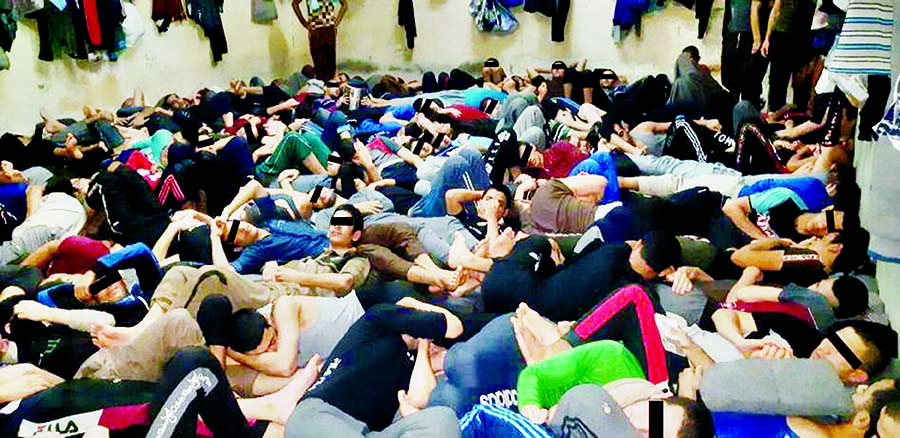
HRW News, (Beirut) :
Nineveh’s extremely overcrowded detention facilities are holding thousands of prisoners in Iraq, most on terrorism charges, for extended periods in conditions so degrading that they amount to ill-treatment. The authorities should ensure that prisoners are not held in inhuman conditions and that there is a clear legal basis for detentions, Human Rights Watch said today.
“The Iraqi government urgently needs to rebuild and rehabilitate its detention facilities,” said Lama Fakih, acting Middle East director at Human Rights Watch. “Iraq has a duty to ensure that detainees are housed decently, in line with international standards.”
Tal Kayf, Faisaliya, and Tasfirat (in the Faisaliya compound), the three pretrial detention facilities in the northern Iraq governorate, have a combined maximum capacity of 2,500 people, according to a senior Iraqi penitentiary expert who requested anonymity. As of late June 2019, they were holding about 4,500 prisoners and detainees. Of that number, 1,300 had been tried and convicted and should have been transferred to Baghdad prisons. The authorities had yet to take the steps needed to transfer them, the expert said, even six months after some were convicted.
The expert shared photos taken in May of female terrorism suspects with their children in one cell in Tal Kayf prison, and juvenile terrorism suspects in another. Two other people who had visited the prison corroborated the conditions of extreme overcrowding seen in the photos and their location. The expert said the cells at Tal Kayf prison holding detainees on other charges are less crowded because of lower numbers.
The expert said the detainees have no space to lie down in their cells or even sit comfortably. Prison authorities have not provided mattresses because there is no room for them in the cells, he said. “These prisons are meant to be a place for rehabilitation but if authorities house detainees in these kinds of conditions, I can only imagine what will happen to them after they are released,” he said. Lawyers do not have access to the prison to visit their clients – among other reasons, because there is no space for meetings.
Human Rights Watch has previously documented deaths in custody in Nineveh stemming from severe overcrowding.
The evidence shared with Human Rights Watch strongly suggests that conditions at the Nineveh pretrial detention facilities are unfit to hold detainees for extended periods of time and do not meet basic international standards. Holding detainees in such conditions amount to ill-treatment.
International norms regarding prison conditions, the United Nations Standard Minimum Rules for the Treatment of Prisoners (the “Mandela Rules”) require that “[a]ll accommodation provided for the use of prisoners and in particular all sleeping accommodation shall meet all requirements of health, due regard being paid to climatic conditions and particularly to cubic content of air, minimum floor space, lighting, heating and ventilation.” The Mandela Rules state that “sanitary installations shall be adequate to enable every prisoner to comply with the needs of nature when necessary and in a clean and decent manner” and that “[a]dequate bathing and shower installations shall be provided.”
The Interior and Justice Ministries should, as an urgent priority, improve conditions and expedite the investigative process, guaranteeing everyone in pretrial detention a speedy and fair trial or release. Authorities should transfer all detainees from these facilities to official prisons built to accommodate detainees and equipped to meet basic international standards.
The authorities should ensure that there is a clear legal basis for detentions, that all detainees have access to legal counsel, including during interrogation, and that detainees are moved to facilities accessible to government inspectors, independent monitors, relatives, and lawyers, with regular and unimpeded access. Judges should order the release of detainees if there is no clear legal basis for holding them or if the government cannot fix the inhuman or degrading conditions in which they are held.
The Iraqi authorities should ensure that detention before trial is the exception, not the rule, and only applied on an individual basis where it is necessary.
Children alleged to have committed illegal acts should be treated in accordance with international juvenile justice standards, Human Rights Watch said. International law allows for authorities to detain children pretrial in limited situations, but only if they are formally charged with committing a crime, not merely as suspects. The authorities should release all children not formally charged.
Iraq should ratify the Optional Protocol to the Convention against Torture, allowing independent international experts to conduct regular visits to detention sites, and should create a staff of independent prison inspectors to monitor conditions.
“Concerns around overcrowding don’t solely affect the detainees, but also the community as a whole,” Fakih said. “The authorities should ensure that the conditions in Iraq’s prisons do not foster more grievances in the future.”

